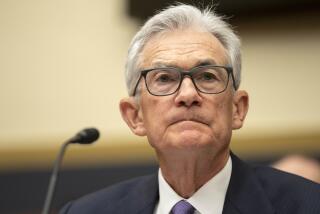Yellen deftly navigates Fed confirmation hearing
WASHINGTON — At her confirmation hearing, Janet L. Yellen demonstrated two qualities that analysts said led to her nomination as the next Federal Reserve chief: a commitment to continuing its aggressive stimulus efforts and a low-key ability to build consensus by disarming her critics.
The former UC Berkeley economist avoided roiling financial markets or Republican skeptics of the Fed’s policies during more than two hours of questions Thursday from the Senate Banking Committee.
And that should put Yellen on course to be confirmed as the first woman to head the world’s most powerful central bank, said Chris Krueger, a senior policy analyst at financial services firm Guggenheim Securities in Washington.
“I thought she pitched close to a perfect game,” he said.
The committee could vote on Yellen’s nomination as early as next week.
The Fed’s vice chair since 2010, Yellen defended its unprecedented efforts to boost the recovery from the Great Recession and the financial crisis. Although some Republicans criticized the massive bond-buying that has flooded financial markets with easy money, Yellen politely but firmly stated she believed the program has helped the economy.
“These purchases have made a meaningful contribution to economic growth and improving the outlook,” she said.
Yellen offered no hints of when the Fed would start reducing its $85 billion in monthly purchases of Treasury bonds and mortgage-backed securities. But she indicated that, if confirmed, she was prepared to continue to aggressively use monetary policy to boost growth.
Although the economy is improving, it still needs help from the Fed, Yellen said. And the stimulus efforts, including keeping short-term interest rates near zero, were the best way to get the economy and the Fed’s monetary policy back to pre-Recession levels.
“A strong recovery will ultimately enable the Fed to reduce its monetary accommodation and reliance on unconventional policy tools such as asset purchases,” she said. “I believe that supporting the recovery today is the surest path to returning to a more normal approach to monetary policy.”
President Obama nominated Yellen last month to succeed Ben S. Bernanke, whose term as chairman ends Jan. 31. She has been a strong ally of Bernanke in trying to stimulate the economy and is viewed as likely to continue his policies.
For those reasons, Democrats strongly support her nomination. Committee Chairman Tim Johnson (D-S.D.) called Yellen “an extraordinary candidate” to lead the Fed.
“We knew what we were getting with Janet Yellen was continuity, and the continuity showed,” said Diane Swonk, chief economist at consulting firm Mesirow Financial and a close follower of the Fed.
But the efforts of the Fed under Bernanke’s leadership haven’t sat well with many Republicans. They said the bond buying, which has caused the total assets on the Fed’s balance sheet to swell to nearly $4 trillion, was like pumping drugs into the financial system to stimulate it artificially.
Critics said the Fed’s policies hurt people with savings by keeping interest rates artificially low and also risk runaway prices, though the annual inflation rate so far has remained below the central bank’s target of 2%.
“I just worry that we’re on a sugar high. And that is a very dangerous thing for the little person out there who is just trying to pay the bills and maybe put a buck away for retirement,” said Sen. Mike Johanns (R-Neb.).
Yellen admitted that low interest rates hurt people, such as senior citizens trying to survive on income from certificates of deposit and other savings.
But she said the struggling economy also affects those same people. Retirees might be unable to get part-time jobs to supplement their fixed incomes. And seniors might have children or grandchildren who are unable to find work.
If those people “take into account the broader array of interest they have in a strong economy, they would see that these policies, even though they may harm them in one respect, are broadly beneficial to them, as I believe they are to all Americans,” Yellen said.
Those types of answers showed how Yellen would try to build consensus on the Fed board, Swonk said.
“She showed her ability to debate and be poised and confident and not get ruffled,” she said.
Yellen also showed political savvy, Swonk said. She met personally with most of the committee members in the days before the hearing, and that appeared to pay some dividends Thursday.
“Dr. Yellen, I do want to tell you I very much appreciate your candor and transparency,” said Sen. Bob Corker (R-Tenn.). “I want to thank you for giving the same answers to questioners here today that you gave in the office.”
Corker is undecided on whether he will vote to confirm Yellen, who would be the first Democrat to lead the Fed since 1987. Many Republicans are expected to oppose her.
Sen. Rand Paul (R-Ky.) said he would try to delay a confirmation vote by the full Senate unless he gets a vote on his legislation to allow for more expansive audits of the Fed.
His so-called Audit the Fed bill would allow the Government Accountability Office to delve into the central bank’s monetary policy actions and decision-making. Yellen said she was committed to improving the Fed’s transparency but opposed the legislation because it could lead to political pressure from Congress on monetary policy.
She told Sen. David Vitter (R-La.) that “allowing the central bank to be independent in formulating monetary policy is critical to assuring markets and the public that we will achieve price stability.”
“And I would be very concerned about legislation that would subject the Federal Reserve to short-term political pressures that could interfere with that independence,” Yellen said.
Vitter, a cosponsor of the legislation, later told Fox News he would vote against Yellen’s nomination.







